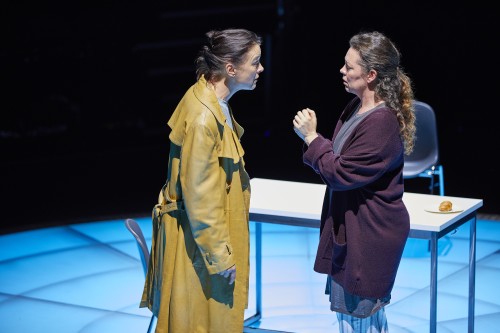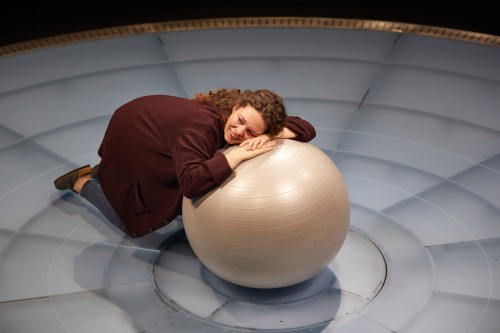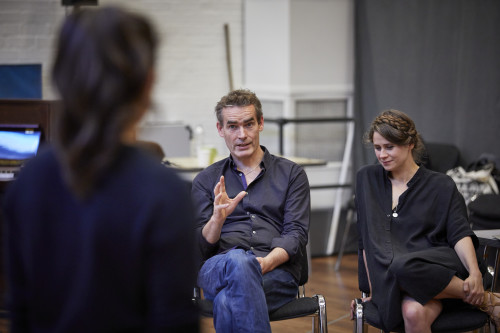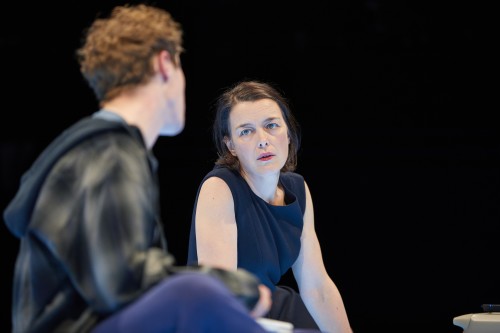
Sceptical siblings: Olivia Williams (left) and Olivia Colman in Mosquitoes by Lucy Kirkwood. (Courtesy: National Theatre/Brinkhoff & Mogenburg)
By Tushna Commissariat
Working at Physics World for the last six years has taken me to some pretty cool labs – everywhere from CERN to the Laser Interferometer Gravitational-wave Observatory (LIGO). My job has allowed me to meet some quite famous people too…at least in the world of physics, that is. But getting to spend a morning at the National Theatre in London watching Olivia Colman and Olivia Williams rehearse for a play is not usual even for me. That is precisely why I jumped at the chance, when I found out that the pair star as sisters in the recently opened play Mosquitoes.
You may be wondering what a play with that moniker has to do with physics. Mosquitoes tells the story of rational and lucid Alice (played by Williams), a particle physicist at the Large Hadron Collider (LHC), and her often-illogical sister Jenny (played by Colman) “who spends a lot of time Googling” and is easily swayed by the bad science she chances upon. Written by Lucy Kirkwood and directed by Rufus Norris – the National Theatre’s current artistic director, the play follows the siblings through a family tragedy, as well as the fairly disastrous switching on of the LHC in 2008, and takes a hard look at our relationships with science, facts, belief and so much more. Kirkwood, whose previous successes include Chimerica and The Children, was commissioned to write the play by the Manhattan Theatre Club as part of its Alfred P Sloan Foundation initiative, which aims to “stimulate artists to create credible and compelling work exploring the worlds of science and technology and to challenge the existing stereotypes of scientists and engineers in the popular imagination”.
I’ll be honest with you: I had my doubts when I first heard about the play and read its short premise, which includes the line “When tragedy throws them together, the collision threatens them all with chaos.” But within a few moments of watching Colman and Williams rehearse (what I later learnt was) one of the play’s most brutal and powerful scenes, I was absolutely captivated. I won’t reveal much about what I watched them perform (spoilers!), but it was quickly apparent to me that Mosquitoes is the play we need in these times of “alternative facts”. The play is set in 2008 because that is when Kirkwood began writing it, and of course the science news making the global headlines at the time was the switching on of the LHC. After nearly a decade of writing, editing (she did a big rewrite after Brexit) and finessing, the play opened last week and is solidly sold out for its entire run until the end of September. In fact, the only way to get a ticket is to try your luck via the National Theatre’s weekly Friday Rush ticket lottery.
I caught up with Kirkwood to talk about art, science, the “human condition” and how it can be improved. “For me, as a lay person, the whole play is about how we engage with brilliant people…I’m split between Jenny and Alice myself when I try to understand science.” She remembers the doomsday headlines about black holes and worse that surrounded the LHC and is intrigued by fear. “Where does such fear come from, especially from usually coherent people?” she ponders. She is quick to add though that she too can be quite irrational at times, and it is often when we are at our most vulnerable that misinformation and its purveyors can get their hooks into you.
This is one of the main themes that Kirkwood explores in the play, about how we are “somehow wired to be a bit fearful” and how this can affect the most rational of people, not to mention those who are more inclined towards unfounded belief. In a telling scene, a pregnant Jenny longs for a cigarette, insisting to Alice that their mother smoked while pregnant with both of them. In the same breath, she refuses to get an ultrasound scan, citing some study she found on the Internet that suggested the procedure was not completely safe. This sort of juxtaposition in reasoning is something that Kirkwood deftly uses throughout the play and is the main source of Jenny and Alice’s disagreements.

Baby bump: Olivia Colman playing a pregnant Jenny. (Courtesy: National Theatre/Brinkhoff & Mogenburg)
For Kirkwood, this behaviour also links to the “current anti-intellectual and anti-expert strain…we can’t seem to separate fact from feeling”. As she and I talk about the false information that surrounded Brexit and the campaign for Britain to leave the European Union, she points out that “the people making these claims knew the information was false, but that didn’t seem to matter”, as these falsehoods would do most harm to the non-elite. In an age where information is power, Kirkwood worries about the “currency of fear”, which has the biggest impact on people who are at their most vulnerable.
As I talk to Kirkwood I can’t help but think of how Williams, who I also had a long chat with after watching the rehearsal, described the playwright. “Her extraordinary skill is in embracing complex philosophical, scientific and psychoanalytical ideas, and putting them into real people and turning them into scenes.” As I ask Williams more about the kind of topics Kirkwood likes writing about, she gets rather poetic herself, telling me “She is sort of boundless…my father used to collect Persian rugs and they say that with Persian rugs if you look at it they have a border on the outside but that the picture inside is infinite and that’s a bit like Lucy Kirkwood’s brain. That her outline is just containing infinite possibilities of thought and drama and we’re just seeing into a little window of her crazy brain.”
Williams describes Mosquitoes as embracing “everything from why we have mass, how the universe began, what the consequences of colliding particle might be and the elusiveness of the Higgs boson”. She adds that Kirkwood’s ability is to take “tangible things and spin them into another place”, for instance, she has turned the Higgs particle into a person who has disappeared. “The other thing she does is that she takes things that have a rational explanation and applies them to what we are, which is irrational beings…how do you know something if you can’t see it? It’s a huge philosophical question which [Kirkwood] tackles in an unbelievably conversational and domestic way…you know, two sisters having a fight about the safety of an ultrasound or the safety of a vaccine.”

Artistic vision: Rufus Norris and Lucy Kirkwood in rehearsals for Mosquitoes. (Courtesy: National Theatre/Brinkhoff & Mogenburg)
Indeed, the arguments and fights that the sisters have are simultaneously some of the most riveting and difficult-to-watch parts of the play. Williams worries that “I am going to be the most hated woman in Britain because I stand attacking a national treasure [Colman] shouting ‘you’re a retard….I reject you and we have to leave you behind and move on!’ ” The scene she is talking about happened to be one of the two I watched the pair perform and I myself couldn’t help feeling bad for Jenny, even though I agreed with much of what Williams’ character Alice was saying – but I suspect that it is these conflicting emotions from varying perspectives that Kirkwood wants us all to think about.
I asked Kirkwood and Williams if they had visited CERN to prep for the role and do research. “We [the National Theatre] have just had a half a million budget cuts so trips to CERN are not included,” says Williams, but she watched some lectures and spoke with a friend who is a producer of BBC Radio 4’s The Life Scientific to try get to grips with the science. She also tells me that in preparing for any role, “I do not need to know what they know…I need to know how to look like I know what they know and to inhabit their attitude of mind. I’m not going to be able to understand the physics but I have to understand how it makes me feel when I find something out or when I find something doesn’t work, or when someone like my younger sister does all her learning with irrational Googling. It’s a funny business because you find yourself asking people who do what you’re pretending to do what they think are the most tangential, bizarre and irrelevant questions…It tends to be things like ‘What shoes do you find comfortable when you’re at CERN?’ ”

Looking ahead: Olivia Williams in Mosquitoes by Lucy Kirkwood. (Courtesy: National Theatre/Brinkhoff & Mogenburg)
Kirkwood concurs, telling me that she usually looks for “emotion rather than data”, although the script does include a lot of scientifically accurate vernacular – “I’m a word junkie and ‘quench’ is a great word!” For this, Kirkwood did have four particle physicists from CERN serving as consultants who regularly advised her on the science. She also confesses that “I have a history of writing plays that are difficult to stage and visualize…but I couldn’t help anthropomorphizing the Higgs boson because I love writing characters.”
Mosquitoes was partially funded by the Institute of Physics (which publishes Physics World), so I was interested to know how both Kirkwood and Williams felt about art–science collaborations and the impact they have on educating people. “I think something moving that has happened in the last 10 years is that I have had much more access to physics and science than I had since I was at school…and I do think there is a collision – please excuse the pun – between the arts and the sciences at last, thank god,” says Williams, adding “Unless people understand how the planet works, we’re going to fuck it up. If we keep rejecting science in all its forms…well the consequences are in this play.” Kirkwood agrees, telling me that just like Jenny and Alice, the arts and the sciences are two parts of the same world, which must come together and push to the future. Williams believes “We should all be hanging out in the same space and talk about each other’s work…so tell all the physicists!”
• Look out for a review of Mosquitoes in the September issue of Physics World.
Guidelines
Show/hide formatting guidelines
this text was deletedwhere people live in harmony with nature and animals</q>
Some text